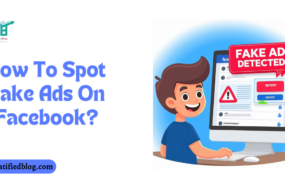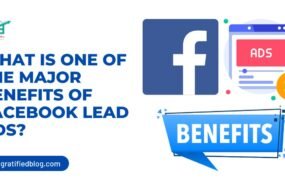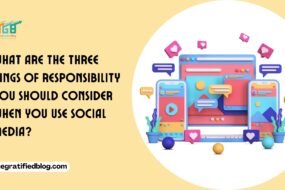
Nonprofits typically face issues when promoting their cause and cultivating donations.
Conventional marketing methods such as direct mail, print media, or knocking on doors used to be effective in the past
But, they are quickly becoming obsolete due to shifting consumer preferences.
Fortunately, social media provides a compelling platform for nonprofits to reach potential supporters globally at a minimal cost.
This blog post will explore social media marketing for nonprofits, its benefits, and some of the best strategies to maximize their digital presence.
What Is Social Media Marketing For Nonprofits?
Source: Youtube
Social media marketing for nonprofits is an effective way to establish relationships and connections with potential donors.
By utilizing various social platforms, organizations can share meaningful content that appeals to their local audiences and people worldwide. Reaching out quickly through these channels will create significant positive results, making it an effective tool for those wanting to make a genuine difference in today’s society.
Here are some tips for using social media for nonprofits: Build a solid foundation of ideas and skills with ten books every social media manager needs to have in their library, including resources on social media marketing for nonprofits. Be authentic and show struggles and successes to make your organization more relatable. Initiate a dialogue and interact with your audience, leveraging the power of social media platforms.
Highlight the specialists who run your programs to strengthen your organization’s credibility in the eyes of potential donors. Showcase previous donors’ generosity to influence potential donors and demonstrate the impact of their contributions. Interact with other people and organizations by resharing like-minded content fostering collaborations and partnerships. Curate social media for nonprofits to find success with online marketing, utilizing strategies and techniques specifically tailored to the nonprofit sector.
Pros Of Social Media For Nonprofits
Social media platforms offer numerous advantages for nonprofits, helping them effectively engage with their target audience, raise awareness, and achieve their organizational goals. Here are some of the pros of social media for nonprofits:
Increased Visibility: Social media marketing for nonprofits has become essential in today’s digital landscape. With social media platforms, nonprofits can leverage their online presence to connect with a broader audience, including potential donors, volunteers, and beneficiaries. By utilizing targeted strategies and engaging content, these organizations can enhance their visibility and extend their reach beyond the limitations of traditional marketing channels. Through social media marketing, nonprofits can create meaningful connections and foster a sense of community, ultimately driving support and furthering their mission.
Budget-Friendly Marketing: Unlike conventional marketing approaches like print or television commercials, social media marketing for nonprofits offers a cost-effective alternative. Nonprofits can easily create accounts on popular platforms and leverage them to share their mission, impact stories, and updates with a broad audience without significant financial investments. This accessibility makes social media an invaluable marketing tool for organizations with limited resources, allowing them to maximize their reach and engage with supporters on a larger scale.
Direct Communication: Social media marketing for nonprofits leverages the power of social media platforms to facilitate immediate and real-time communication between organizations and their supporters. By utilizing these platforms, nonprofits can effectively respond to queries, share valuable information, and actively engage in meaningful conversations with their audience. This proactive approach fosters transparency, builds trust, and strengthens stakeholder relationships.
Community Building: Social media marketing for nonprofits is a powerful tool that allows organizations to harness the potential of online platforms to build an online community of supporters, volunteers, and like-minded individuals. By leveraging social media platforms like Facebook groups or Twitter chats, nonprofits can foster engagement, share valuable knowledge, and facilitate meaningful discussions among their community members. These platforms provide an ideal space for nonprofits to implement their social media marketing strategies, allowing them to connect with their target audience and raise awareness about their cause.
Fundraising Opportunities: Nonprofits can effectively utilize social media marketing for nonprofits to bolster their fundraising campaigns and donation efforts. With platforms such as Facebook and Instagram at their disposal, organizations can create dedicated fundraising pages that serve as powerful channels for sharing compelling stories and engaging with their supporters. These platforms provide a broad reach and offer seamless and user-friendly options for individuals to contribute financially, making it easier than ever for nonprofits to harness the potential of social media in driving their mission forward.
Storytelling And Impact Sharing: Social media platforms provide nonprofits with a powerful storytelling medium for their social media marketing efforts. By leveraging these platforms, organizations can effectively share impactful stories, case studies, and testimonials highlighting their mission and demonstrating the positive change they bring about in the community. Through strategic social media marketing for nonprofits, these stories can reach a wider audience and connect with them emotionally, inspiring them to take action and support the cause.
Advocacy And Awareness: Social media platforms provide nonprofits with a powerful storytelling medium for their social media marketing efforts, including social media marketing for nonprofits. By leveraging these platforms, organizations can effectively share impactful stories, case studies, and testimonials highlighting their mission and demonstrating the positive change they bring about in the community. Through strategic social media marketing for nonprofits, which includes targeted messaging and engagement tactics, these stories expand your reach and establish connections with a broader audience. Emotionally. This connection is crucial in inspiring individuals to take action and support the cause, making social media marketing an invaluable tool for nonprofit organizations.
Targeted Audience Segmentation: Nonprofit organizations have recognized the immense potential of social media platforms, including social media marketing for nonprofits, to reach their target audience effectively. With advanced targeting capabilities, these platforms allow nonprofits to tailor their messages and campaigns to resonate with specific demographics, interests, or locations, maximizing their impact. By harnessing the power of social media, nonprofits can engage and mobilize their supporters more effectively, ultimately increasing the chances of generating valuable engagement and support. For instance, nonprofit social media examples showcase how organizations have successfully utilized these platforms to connect with individuals who share a passion for their cause, inspiring them to take action and make a positive impact.
Real-time Feedback And Insights: Nonprofits can leverage the power of social media marketing to reach and engage their target audience effectively. By incorporating social media marketing for nonprofits into their overall strategy, organizations can increase their online visibility and gain valuable feedback and insights. Monitoring comments, engagement rates, and analytics on platforms like Facebook, Instagram, and Twitter can provide helpful information about what resonates with the audience. This data-driven approach allows nonprofits to refine their strategies, create compelling content, and improve their overall impact.
Collaboration And Partnerships: Social media marketing for nonprofits takes advantage of these platforms’ networking and collaboration opportunities. Organizations can connect with other like-minded entities, expanding their reach and forming valuable partnerships. By leveraging social media, nonprofits can easily share resources, collaborate on campaigns, and amplify their collective impact, ultimately advancing their mission and making a difference in the world.
While social media offers numerous benefits, nonprofits must develop a well-planned social media strategy, prioritize engagement and relationship-building, and ensure responsible use of these platforms to maximize their impact and avoid potential pitfalls.
Cons Of Social Media For Nonprofits
Time And Resource-intensive: Managing social media accounts can be time-consuming, requiring regular updates, content creation, responding to messages and comments, and monitoring analytics. Nonprofits with limited staff and resources may need help to allocate time and personnel for effective social media management.
Information Overload: Social media platforms are saturated with content, making it challenging for nonprofits to distinguish themselves and attract the attention of their intended audience. With the constant influx of posts, tweets, and videos, ensuring your nonprofit’s messages are seen and remembered can take time.
Negative Feedback And Criticism: Social media can provide a platform for individuals to voice their opinions, including negative feedback or criticism towards your nonprofit’s work, strategies, or campaigns. Dealing with negative comments or managing potential conflicts in a public forum can be challenging and may require careful handling.
Limited Control Over Platform Policies: Social media platforms have policies and algorithms that dictate how content is displayed and promoted. Changes in these policies can impact the reach and visibility of your nonprofit’s content. For example, algorithmic updates may reduce the organic reach of your posts, requiring you to invest in paid advertising to maintain visibility.
Potential For Misinformation And Rumors: Social media can be a breeding ground for misinformation and rumors. Nonprofits may need help countering false information about their organization or mission, and the rapid spread of rumors can negatively impact their reputation or cause confusion among their audience.
Privacy And Data Concerns: Nonprofits must consider the privacy implications when using social media platforms, as they often collect and use personal data—instances of data breaches, unauthorized entry, or improper use of personal information. Information can lead to reputational damage and legal issues.
Donor Fatigue And Competition: Social media platforms are flooded with fundraising appeals and donation requests, leading to donor fatigue and increased competition for financial support. It can be challenging for nonprofits to break through the noise and maintain donor engagement and support over time.
Dependency On Platform Changes: Nonprofits relying heavily on a specific social media platform for their outreach and communication may face risks if the platform becomes less popular or shuts down. More than relying on a single platform can hinder the ability to adapt and reach audiences on alternative platforms.
To mitigate these cons, nonprofits should carefully consider their social media strategies, allocate sufficient resources, and maintain a consistent and authentic presence across multiple channels. It’s essential to set realistic expectations, monitor and adapt to changes in platform policies, and actively engage with followers to foster a sense of community and trust.
Best Ways To Create A Successful Nonprofit Social Media Strategy
There are several things to consider when creating a solid nonprofit social media strategy, such as:
Identify The Right Social Media Platform

Source: travelpayouts.com
Facebook is a powerful platform for nonprofits, and it’s easy to see why. Here are some reasons why Facebook is an excellent tool for fundraising and promoting your cause: You can add visuals and post updates to further your cause. You can embed links, making Facebook a great one-stop shop if you’re short on time.
Facebook is quick to set up, making it an excellent option for nonprofits looking to start with social media. Facebook provides free promotions and meets your donors where they stand. Some nonprofits are already ahead of the curve and can offer valuable insight into setting up your social media pages.
Facebook is a great way to deepen your relationship with your supporters while expanding your influence in the community. Suppose you want to promote your nonprofit organization through a solid and professional Facebook page. In that case, social media isn’t going away anytime soon, so be confident your organization stays with it by using Facebook. If you want to explore social media avenues for your nonprofit, choosing Facebook should be at the top.
Twitter is a valuable asset for nonprofits, providing them real-time access to engage with their audience and discuss relevant topics. The platform’s brief notifications, posts, and hashtags allow organizations to quickly connect with supporters during critical times when they are most eager to hear from the nonprofit.
Twitter is a direct line of communication with people who are invested in the cause the nonprofit serves, whether they are already committed donors or just discovering the organization for the first time. Nonprofits can leverage Twitter to cultivate new followers and donors to grow their impact.
Twitter’s open nature can spark conversations among people facing similar struggles worldwide, and nonprofits can use the platform to raise awareness and help break the stigma associated with mental health. Finally, nonprofits can use Twitter to upload powerful photos and videos, retweet relevant content, and tap into cause awareness and giving days.
Instagram is a captivating, image-forward medium that can immensely benefit nonprofits. Utilize this platform to broadcast your cause visually compellingly and capture viewers’ interest through hashtags and likes.
This site may also be helpful when announcing initiatives, seeking volunteers, and sharing event photos related to your nonprofit organization.
Define Your Goals

Source: tedxtuwien.at
Utilizing social media platforms effectively, increasing followers and engagement, leveraging user-generated content, collaborating with influencers and partner organizations, and implementing targeted advertising strategies. By setting clear social media goals for nonprofits, such as raising awareness, driving donations, or mobilizing volunteers, you can tailor your content and campaigns accordingly, ensuring maximum impact and success in your mission.
- I am gathering direct feedback from donors.
- It is prompting event registrations.
- I am developing an email list of true potentials.
- We are enhancing brand engagement with social media platforms.
- Ultimately escalating website traffic and awareness.
Determine Your Target Audience

Source: vecteezy.com
Take the time to identify your target audience; consider age range, geography, and interests or values that best suit your organization’s mission, including the keyword “best nonprofit social media.” Are there specific areas from which you anticipate more supporters? How old are these individuals typically? Investigate what factors connect them, such as their preferred social media platforms, to optimize your content and garner maximum reach on available channels.
Engage Your Audience With An Innovative Social Content Strategy

Source: futurelearn.com
Crafting a content plan for your nonprofit is essential to comprehend why people feel passionate about your organization and what motivates their loyalty. You can gain valuable insights by asking questions and gathering information through emails, surveys, and interviews with donors, supporters, and volunteers. Additionally, it’s essential to closely examine the data from social media accounts, including nonprofit social media strategy examples, to understand what has been successful or unsuccessful. This analysis will help you refine your social media strategy and craft compelling content that connects with and captivates your audience.
Run A Hashtag Campaign

Source: linkedin.com
Utilizing a concise hashtag and an effective nonprofit social media strategy, you can encourage individuals to join the dialogue by posting with your designated hashtag.
Doing so will aid in growing awareness about your cause, reaching new people who otherwise would not have been exposed to it.
Consequently, it is essential to pick a memorable hashtag that effectively communicates your message; for instance, UNESCO’s #TruthNeverDies, which was used to call attention to the need to protect journalists’ rights of expression, earned more than 2 million impressions and has been shared on Twitter over 29.6K times!
Share Stories About People

Source: istockphoto.com
Harnessing the power of individual stories is an excellent way to bring attention and increase involvement with your cause.
Create brief videos featuring those who benefit from your organization’s work or arrange interviews focusing on critical figures’ experiences related to the nonprofit.
Furthermore, have volunteers share their experiences on social media platforms to humanize and put a face behind all you do – this will help make it more relatable for others!
Conclusion
I hope you understand why social media marketing is essential for nonprofits and how to take advantage of it. Using these reliable strategies, you can easily create a compelling presence that allows you to maximize the impact of your nonprofit organization.
Furthermore, this will enable you to engage with your followers, attract new admirers and supporters, uncover what they find most attractive, and even fundraise.
If you have any doubts about social media marketing for a nonprofit organization or want to learn more, feel free to get in touch. We will be happy to help you out.
Thanks for reading








No Comments